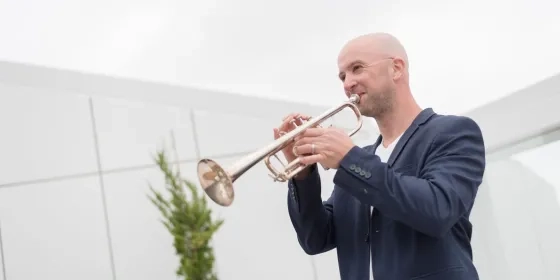Adam Luftman on what it takes to pursue a music career
The principal trumpet of San Francisco Opera and Ballet and SFCM Chair of the Brass Department says discipline, smart practicing, and being stylistically versatile are key.
In his own words, Adam Luftman discusses how practicing smarter can lead to lifelong musical improvement.
Discipline and work ethic are non-negotiables for people who want to pursue a career in music. One must be organized about their practice. It's not about practicing more than anyone else—but practicing smart and taking care of the things that need to get done.
You need to know the appropriate times to step on the gas and be extra hard on yourself, and also when it’s time to back off and trust your preparation. Be incredibly diligent and keep a good record of your practice and discoveries in a notebook.
You need to make sure that you are always taking steps toward your end goal.
In addition to practice on the horn, this can also be achieved through score study with recordings, visualization and singing of rep, and listening/analysis of recorded practice sessions. It is important to avoid becoming just an excerpt head and strive to be a well-rounded artist. Listen to string chamber music, great singing, and other genres of music that inspire you.
As a brass player, you must be stylistically versatile. One of my students had his first opportunity to sub with the San Francisco Symphony on a pops concert that was mainly big band arrangements of Sinatra tunes. He had never been taught how to swing prior to beginning studies at SFCM. Luckily, the stylistic work we had been doing and a crash course lesson when the book arrived, set him up for success on the gig.
You have to be constantly curious and constantly trying to improve—even once you have established yourself as a professional. This passionate, life-long quest for improvement is one of the beautiful things about a career in music.
Follow SFCM on Instagram for more personal stories from across the Conservatory community.
